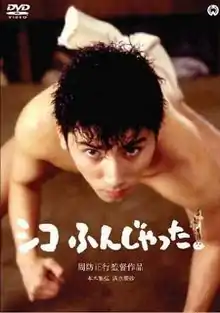Sumo Do, Sumo Don't
Sumo Do, Sumo Don't (シコふんじゃった。, Shiko funjatta) is a 1992 Japanese film directed by Masayuki Suo. It was chosen as Best Film at the Japan Academy Prize ceremony. It is one of the few notable depictions of sumo in film.[1]
| Sumo Do, Sumo Don't | |
|---|---|
 DVD cover for Sumo Do, Sumo Don't (1992) | |
| Directed by | Masayuki Suo |
| Produced by | Shōji Masui |
| Written by | Masayuki Suo |
| Starring | Masahiro Motoki Misa Shimizu Naoto Takenaka |
| Music by | Yoshikazu Suo |
| Cinematography | Naoki Kayano |
| Edited by | Junichi Kikuchi |
Production company | |
| Distributed by | Daiei Miramax |
Release date |
|
Running time | 103 minutes |
| Country | Japan |
| Language | Japanese |
Plot
Kyoritsu University student Shuhei Yamamoto gets a job with his uncle's connection but learns he's missing the credits to graduate from the supervisor of his graduation thesis, Professor Anayama. He makes a deal with Shuhei that if he participates in the tournament for Kyoritsu's sumo club, he would be willing to overlook his credits. Shuhei reluctantly accepts with the request of Natsuko Kawamura, a graduate student from the Anayama Lab and a sumo club manager.
The Sumo Club's only member is Aoki Tomio, a traditionalist sumo enthusiast who has repeated years. Shuhei and Aoki struggle to recruit Shuhei's younger brother Haruo and obese Hosaku Tanaka. The amateur team loses at the tournament, and are abused by alumnus at the afterparty. Shuhei promises they'll win next, recruiting a British student and experienced footballer George Smiley who joined to save on rent. During the summer vacation, the team visits Anayama's hometown for a training camp. At the end of the camp, the team plays a practice match against elementary schoolers in the neighbourhood.
The team wins the next third league match and replaced the second league. Haruo breaks his arm in the third match, and Shuhei is injured. Masako Mamiya, a female manager longing for Haruo, volunteers to join as a member. On the day of the match, Masako binds her chest with bandages and tape but loses. The Sumo Club is inspired by her attempt and win the league match.
Tanaka is scouted for sumo wrestling, Smiley returns to Britain, Masako and Haruo leave to study abroad in London, and Aoki graduates. Shuhei declines the job offer to continue the sumo club as the sole member. Natsuko visits him in the club, and the movie ends as they playfully practice shiko.
Cast
- Masahiro Motoki as Shuhei Yamamoto
- Misa Shimizu as Natsuko Kawashima
- Naoto Takenaka as Aoki Tomio
- Akira Emoto as Professor Tokichi Anayama
- Kaori Mizushima as Chie Asai
- Hiromasa Taguchi as Hosaku Tanaka
- Robert Hoffman as George Smiley
- Kentarô Sakai
- Masaaki Takarai as Haruo Yamamoto
- Ritsuko Umemoto as Masako Mamiya
- Masaru Matsuda as Tatsuo Horino
- Hiroshi Miyasaka as Hokudo no Ken
- Goro Kataoka as Hayashi
- Naomasa Musaka as Kumota-san (Sumo OB)
- Fuyuki Murakami as Yasujiro Mine (OB-Kai Kaicho)
Reception
The film has been described by Japan Times columnist and sumo commentator John Gunning as "well-crafted and at times touching" and he notes that it is virtually the only big-screen sumo film with the exception of the Wakanohana Kanji I biopic Devil of the Dohyō.[2]
Awards and nominations
16th Japan Academy Prize[3]
- Won: Best Picture
- Won: Best Director - Masayuki Suo
- Won: Best Screenplay - Masayuki Suo
- Won: Best Actor - Masahiro Motoki
- Won: Best Supporting Actor - Naoto Takenaka
- Nominated: Best Supporting Actress - Misa Shimizu
- Nominated: Best Editing - Junichi Kikuchi
References
- Gunning, John (17 September 2019). "Sumo 101: Sumo on the silver screen". Japan Times. Retrieved 21 October 2019.
- "Fans have to turn to other options for their sumo fix during virus-related down period". Japan Times. 13 May 2020. Retrieved 26 May 2020.
- 第16回 日本アカデミー賞 (in Japanese). Japan Academy Prize. Archived from the original on December 21, 2008. Retrieved 29 January 2009.
External links
- Shiko funjatta (1992) at IMDb
- Shino Funjatta at AllMovie
- シコふんじゃった。 (in Japanese). Japanese Movie Database. Retrieved 2009-05-14.
- "SHIKO FUNJATTA". Complete Index to World Film. Retrieved 2009-05-14.
- シコふんじゃった。 (in Japanese). www.walkerplus.com. Retrieved 2009-05-14. External link in
|publisher=(help) - シコふんじゃった。(1991) (in Japanese). allcinema.net. Retrieved 2009-05-08.
- シコふんじゃった。 (in Japanese). Variety Japan. Retrieved 2009-05-14.